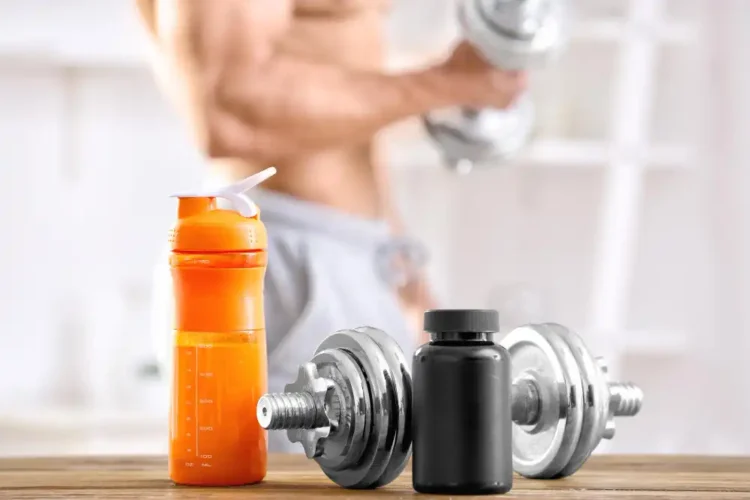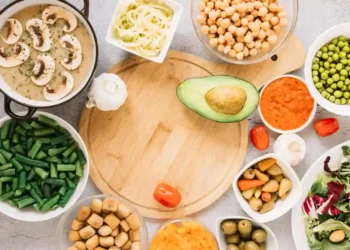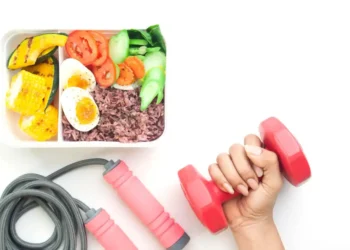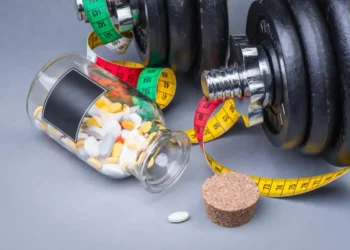Protein is really important for muscle recovery and growth after working out. It’s not just for building muscles. Protein helps in fixing muscles, giving you post-workout nutrients, starting protein making, and adding to muscle growth.
Are you an athlete, love keeping fit, or just want to heal better after working out? Knowing the value of protein is crucial. Adding protein to what you eat and drink helps you heal faster, lessens muscle ache, and boosts muscle size.
Key Takeaways:
- Protein is essential for muscle recovery and growth
- It aids in muscle repair, post-workout nutrition, and protein synthesis
- Incorporating protein into your routine can optimize post-workout healing
- Protein reduces recovery time and alleviates muscle soreness
- Plant protein supplements and protein-rich foods are excellent options
The Benefits of Protein for Muscle Recovery
Protein helps your muscles recover and grow. It’s key for fixing and strengthening muscles, making you stronger. By eating protein after a workout, you give your muscles the nutrients they need to heal. This helps you recover faster and reach your fitness goals.
Protein isn’t just for building muscles. It also cuts down the time you need to recover between workouts. Having protein after you exercise gives your muscles the energy to heal. As a result, you can recover swiftly from tough workouts and keep performing well.
Protein can also lessen how sore your muscles get. The building blocks of protein, called amino acids, reduce muscle swelling. This can help you feel less stiff and achy after working out.
Eating protein also boosts your immune system. Exercise can sometimes weaken your immune system. But, protein helps keep it strong, lowering your risk of illness. This is key for those who work out a lot or play sports.
So, including protein in your meals can do a lot. It can speed up your recovery, lessen soreness, and keep you from getting too sick. For the best results, pick good sources of protein and eat them regularly.
Importance of Protein for Muscle Growth
“Protein is a key building block for muscle growth. It gives your body the stuff it needs to make new muscle. Without it, your muscles can’t repair and grow like they should.” – Dr. Amanda Johnson, Sports Nutritionist
Protein’s Role in Muscle Repair and Growth
Protein is key for muscle repair and growth, known as the building block of life. Getting the right amount of protein is crucial for recovery.
Protein has amino acids needed for creating new muscle tissue. It helps our bodies fix and grow muscles, boosting strength.
After working out, it’s crucial to eat enough protein to help your muscles repair and grow. The needed protein amount depends on your weight, activity, and goals. Normally, aim for 0.8-1 gram of protein per pound of your weight daily for the best muscle recovery and growth.
Adding enough protein to your meals supports your body in mending and growing muscles. Whether you eat lean meats, beans, or protein shakes, getting your daily protein helps a lot.
The Role of Optimal Protein Intake
Eating the right amount of protein helps your muscles repair and grow. This way, your body gets the amino acids it needs to rebuild your muscles.
Studies prove that enough protein doesn’t just repair and grow muscles, but also make them stronger and work better. It boosts how quickly your body can repair muscles, making them tougher and improving your overall performance.
Eating protein after workouts helps turn on muscle repair, making your body repair muscles well and boosting your gains.
| Benefits of Optimal Protein Intake | How to Achieve Optimal Protein Intake |
|---|---|
|
|
Protein is essential for muscle growth and repair. By making sure you eat enough high-quality protein, you’re giving your body the power to build and fix muscles.
Everyone needs a different amount of protein, so talking to a professional is smart. They can help you figure out exactly how much protein you need for your goals. Adding the right protein to your diet can help your muscles grow and repair better, taking your fitness to new heights.
Incorporating Protein into Your Post-Workout Routine
To boost muscle recovery, adding protein after your workout is key. Eat protein-rich foods and enjoy protein shakes. This way, you fill up on protein and help your muscles grow. Other tips to add protein after working out include:
1. Choose Protein-Rich Foods
Add lean meats like chicken, turkey, and lean beef to your meals. Fish, including salmon and tuna, are great too. For vegans and vegetarians, tofu, beans, and lentils are your best protein friends. These options are high in protein and kind to your waistline and heart.
2. Spread Protein Intake throughout the Day
Make sure to get protein in every meal and snack time. This keeps a healthy flow of amino acids to your muscles. For breakfast, have Greek yogurt with berries. Later, a chicken salad can be your protein fix. End the day with a protein-packed smoothie.
3. Consider Protein Supplements
For those who need more protein or are always on the go, protein supplements can be handy. They help you meet your protein goals fast and easily. Choose protein powders that are low in sugar and artificial stuff. Experiment with different flavors to keep things fun.
4. Replenish Protein Levels with Protein Shakes
Right after working out, your body craves protein to start recovery fast. Adding protein shakes makes it easy to boost your levels. A mix of your chosen protein powder, almond milk, and fruit is a perfect start. It’s a mix that’s got your muscle’s back.
Post-workout nutrition is essential for muscle recovery. Get creative with how you add protein. Be it through meats, plants, or shakes, protein is your fitness partner.
Conclusion
Protein is key for your muscles to heal and grow. It helps fix muscles, making them less sore and boosts your immune system. Eating enough protein after you work out improves how fast your muscles recover and helps them grow.
It’s important to get protein in your meals and snacks, like from lean meat, fish, tofu, beans, and lentils. Make sure to have protein at different times of the day. This will keep your muscles strong and your body burning energy well. If you’re in a hurry, protein powders are an easy way to get what you need.
Don’t forget, getting your muscles back in shape after you exercise is key. Protein is essential for this. It helps you get to your goals faster and makes your training more effective. So, use the power of protein to be your best in every workout.











